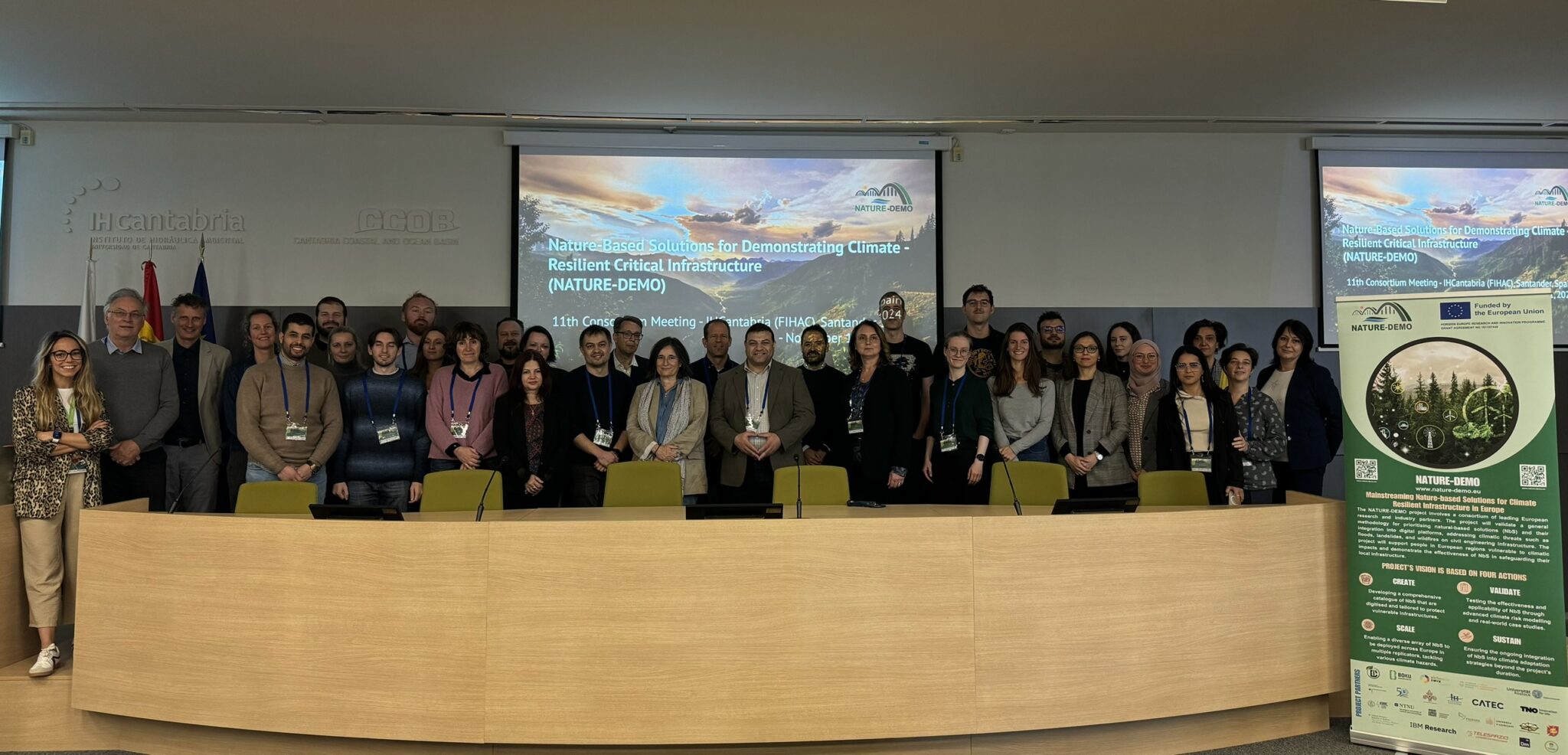IHCantabria hosts the first consortium meeting of the European project NATURE DEMO

Members of the NATURE DEMO project consortium who are meeting at the IHCantabria facilities from November 19 to 21, 2024
The main objective of this meeting is to review the technical progress of each work package, in order to implement NbS to protect critical infrastructure in Europe against climate change threats, and to coordinate next steps
The Environmental Hydraulics Institute of Cantabria (IHCantabria) is hosting the first Consortium meeting of the NATURE DEMO project, which will be held on November 19-21, 2024, at the facilities of this research center in Santander, Spain.
The objective of this project is to develop, validate, and promote Nature-based Solutions (NbS) to protect critical infrastructure against climate threats. In the context of increasingly frequent climate disruptions, the resilience of European infrastructure is essential for sustaining the economy, social well-being, and stability across the continent. This challenge represents a historic opportunity to integrate infrastructure with nature, involving sectors such as transportation and energy, and fostering collaboration between infrastructure owners, scientists, academia, and authorities.
NATURE DEMO project is a four-year research and innovation action running from May 2024 to April 2028. It is funded by the European Union’s Horizon Europe Program (Grant No. 101157448), with a total budget of €9.19 million, of which nearly €7.76 million comes from EU contributions.
The project consortium is coordinated by DigInnoCent s.r.o. (Czech Republic) and includes 23 partners from 14 European countries, including IBM Research GMBH (Switzerland), Telespazio UK Limited (UK), Vienna University of Natural Resources and Life Sciences (Austria), Alchemia-nova (Austria), University of Rostock (Germany), Fundación Andaluza para el Desarrollo Aeroespacial (Spain), University of Transylvania (Romania), Norwegian University of Science and Technology (Norway), Democritus University of Thrace (Greece), and infrastructure entities managing the pilot cases.
To achieve its objectives, the project is organized into 7 work packages covering the design of NbS, development of a digital decision support platform, creation of living labs, implementation of NbS at the regional level, and their mainstreaming and communication. The project also includes management, coordination, and results dissemination work packages.
During the three-day consortium meeting, the partners are presenting their technical progress from the different work packages and define and plan the next steps. IHCantabria is represented by Javier López Lara, head of the Climate Risk, Adaptation and Resilience Group; María Fuentes Álvarez de Eulate, Esther Barrios Crespo and Yailin Fernández González, researchers of the same group, and Silvia Fernández Rodicio, member of the European Projects Unit.
The group of representatives of IHCantabria are presenting the work that the institute is developing in the project, mainly in the work package that consists of defining a methodology to assess the risks of critical infrastructures, considering the effects of climate change, and selecting NbS as priority adaptation measures.
In collaboration with IBM Research GmbH and Telespazio UK Ltd., this methodology will form the basis for creating a “Digital Decision Support Platform” to prioritize and manage NbS against climate threats, such as floods, landslides, and forest fires. The work is carried out alongside the managers of the pilot cases, which include critical infrastructures in five locations across the Alpine biogeographical region: Lattenbach (Austria), Brasov (Romania), Ljubljana (Slovenia), Zvolen (Slovakia), and Globocica (Macedonia).
During the first day of the meeting, a specific session has been held with members of the project’s Advisory Committee, where a summary of ongoing activities was presented; their feedback will be incorporated into the project’s development. In addition to the work package follow-up sessions, working meetings are planned to address specific issues that may arise, as well as a visit to IHCantabria’s facilities.
More information on this project can be found at the following link.
Project funded by the European Union. Views and opinions expressed are however those of the author(s) only and do not necessarily reflect those of the European Union or the European Climate, Infrastructure and Environment Executive Agency (CINEA). Neither the European Union nor the granting authority can be held responsible for them.




